Victorville, California
Victorville is a city located in the Victor Valley of San Bernardino County, California. Its population as of the 2010 census was 115,903.[7]
Victorville, California | |
|---|---|
City | |
| City of Victorville | |
.jpg) A motel in Victorville | |
 Flag 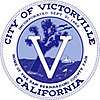 Seal | |
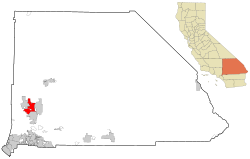 Location of Victorville in San Bernardino County, California | |
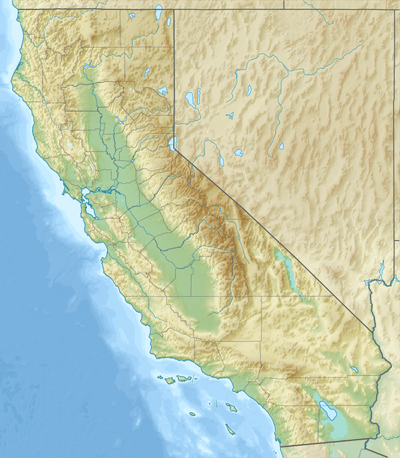 Victorville Location within California  Victorville Location within the United States | |
| Coordinates: 34°32′10″N 117°17′28″W[1] | |
| Country | United States |
| State | California |
| County | San Bernardino |
| Incorporated | September 21, 1962[2] |
| Named for | Jacob Nash Victor[3] |
| Government | |
| • Mayor | Gloria Garcia[4] |
| • City manager | Doug Robertson[5] |
| Area | |
| • Total | 74.01 sq mi (191.69 km2) |
| • Land | 73.72 sq mi (190.94 km2) |
| • Water | 0.29 sq mi (0.74 km2) 0.76% |
| Elevation | 2,726 ft (831 m) |
| Population | |
| • Total | 115,903 |
| • Estimate (2019)[8] | 122,385 |
| • Rank | 5th in San Bernardino County 49th in California |
| • Density | 1,660.07/sq mi (640.96/km2) |
| Time zone | UTC−8 (Pacific Time Zone) |
| • Summer (DST) | UTC−7 (PDT) |
| ZIP Codes | 92392–92395[9] |
| Area codes | 442/760[10] |
| FIPS code | 06-82590 |
| GNIS feature IDs | 1652806, 2412156 |
| Website | www.victorvilleca.gov |
History
In 1858, Aaron G. Lane came to what is now known as Victorville and founded a way station called "Lane's Crossing." For many years it provided shelter and supplies for people making the journey across the desert from the east to San Bernardino. Lane's Crossing was on the Mojave River on today's Turner Road, two miles north from where Interstate 15 crosses the river. Captain Lane was a veteran of the Mexican–American War who had suffered from malaria during that war. Originally he migrated west to join the California gold rush, but he learned that he could make a better living selling supplies to the miners.
He settled in Ione, near Sutter's Mill in northern California, during those years, but he migrated to San Bernardino in 1857. He settled on the Mojave River in 1858, where he established his way station. He later sold out to Texan John Fry Miller, who changed the name of Lane's Crossing to Pioneer Station.[11] Miller was a rancher and became involved in Mojave Valley politics, setting up the first polling place in the area at his home. That first year, ten citizens cast their votes at Lane's residence, rather than making the long trip to San Bernardino.[12]
Census records show that ten people lived in two residences on the river by 1860. Listed in Dwelling No. 703 were Aaron Lane, William R. Levick, and the Nicholson family, consisting of George and Frances, and their three children aged 9 to 13. Joseph and Mary Highmoor lived in Dwelling No. 704, with a seven-year-old female named Anna.[13]
The Levick, Nicholson and Highmoor families were Mormon pioneers. Highmoor established a way station called Highmoor's Crossing, which was near today's Oro Grande bridge of the National Trails Highway (known as U.S. Route 66), over the Mojave River at what is called the Lower Narrows. The Nicholson family moved downriver a few miles and established a way station at "Point of Rocks" in today's Helendale area.
In 1867, Lafayette Meacham, a Mormon who ran a way station near today's Barstow area, made a new wagon road from his stage stop to what is now Old Town Victorville. It crossed the Mojave River at today's Sixth Street. This new road, now called Stoddard Wells Road, was a short-cut across the desert and became a popular route for muleskinners and freighters. The river crossing was called Mormon Crossing and the surrounding area became known by that name.
In the 1870s, Heber "Pete" Huntington established a stage stop, Huntington Station, at Mormon Crossing. Also a Mormon pioneer, Huntington was leader Brigham Young's nephew. Huntington later bought out the Stoddard brothers, who had a way station half way to today's Barstow from Victorville, and also bought out the Meachams, who ran the stage stop named Fish Ponds or Mormon Grocery.
In 1885, the newly established telegraph station at the railroad siding of "Victor", named for the California Southern Railroad's General Manager Jacob Nash Victor, was the beginning of what developed as today's Old Town Victorville. The village which sprang up around that railroad facility became known by the same name of Victor.
In 1901, at the suggestion of local postmistress Abbey Turner, the U.S. Post Office Department changed that name to Victorville to stop the postal confusion with the town of Victor, Colorado.
In 1926, U.S. Route 66 was begun, being marked in many areas on existing roads. In Victorville, US 66 is marked on D and Seventh streets, with a section of Interstate 15 going towards the Cajon Pass. It is the primary street through Old Town Victorville.
In 1940, Herman J. Mankiewicz and John Houseman wrote the first two drafts of the screenplay for the film Citizen Kane in Victorville. They worked in seclusion for 12 weeks while residing at the North Verde Ranch, now called the Kemper Campbell Ranch.[14]:32[15]
The Victorville Army Airfield was constructed beginning in 1941. It was renamed as the George Air Force Base when the U.S. Air Force was established in October 1947. After decades of service to the Air Force, in 1992 George Air Force Base was closed.
Its land was turned over to other uses. Part of it is now the Southern California Logistics Airport. The former Air Force base housing area is now vacant. It forms a ghost town that is used for military training by troops from the U.S. Army's Fort Irwin Military Reservation. The Victorville Federal Penitentiary has been built on another part of the former air base.
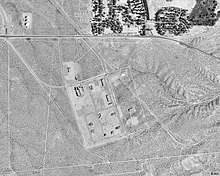
The city of Victorville was officially incorporated by the State of California on September 21, 1962.
On August 14, 1977, actor Ron Haydock was struck and killed while hitchhiking near Victorville.
In 2003, the Roy Rogers and Dale Evans Museum[16] was moved from Victorville to Branson, Missouri. It closed before 2015.
On November 3, 2007, Victorville hosted the DARPA Urban Challenge, a six-hour autonomous robot driving contest through the streets of the Southern California Logistics Airport. The $2 million first prize went to the Carnegie Mellon University team.
Geography
Victorville is located at the southwestern edge of the Mojave Desert, 81 miles (130 km) northeast of Los Angeles, 143 miles (230 km) north of San Diego, 188 miles (303 km) southwest of Las Vegas, 32 miles (51 km) south of Barstow, 48 miles (77 km) east of Palmdale, and 36 miles (58 km) north of San Bernardino through the Cajon Pass on Interstate 15. Victorville is the location of offices of the "Mojave Desert Branch" of the San Bernardino County government.
Victorville is bordered by Apple Valley on the east, Hesperia on the south, and Adelanto on the west. The Mojave River flows sporadically through Victorville. The elevation at City Hall is approximately 2,950 feet (900 m) above sea level.
According to the United States Census Bureau, the city has a total area of 73.7 square miles (191 km2). 73.2 square miles (190 km2) of it is land and 0.6 square miles (1.6 km2) of it is water. The total area is 0.76% water.
Climate
The city is located in the High Desert, an area known for its unique and moderate weather patterns. The National Weather Service has maintained a weather station in Victorville since 1917. Official records show that Victorville has a cold desert climate (BWk) with four distinct seasons. Due to the higher elevation and inland location of the High Desert, the climate tends to be more extreme than in the Los Angeles Basin and other Southern California lowland regions.
Winter is the region's wet season, when Victorville receives the most storms. Due to the rain shadow effect caused by the San Bernardino Mountains and San Gabriel Mountains, the rainfall received is less than in the Los Angeles basin or even the San Bernardino Valley. Temperatures tend to be cool, with overnight low temperatures dropping to or below freezing on average. While the high temperatures average around a mild 60 °F (16 °C), there are periods in which the high temperature fails to reach 50 °F (10 °C) or even 45 °F (7 °C). Low temperatures can dip below 25 °F (−4 °C) on occasion, with very cold temperatures possible; the record lowest temperature was −1 °F (−18 °C).[17] Snowfall and other wintry precipitation is also possible, although any snowfall tends to be very light and melt quickly; significant snowstorms as seen in the San Bernardino Mountains and San Gabriel Mountains are very rare.[18][19] Black ice is also possible during the winter season.[20]
Summer days are generally hot, with average high temperatures approaching 100 °F (38 °C). It is also the time of year in which Victorville, and Southern California as a whole, receives the least precipitation. The higher elevation prevents the temperatures from matching the extreme heat seen in lower desert cities such as Palm Springs or Needles. However, heat waves can still raise the temperature to 110 °F (43 °C), with the all-time record high being 116 °F (47 °C).[21] Also unlike lower desert communities, the diurnal temperature variation is greater, allowing substantial relief to occur at night with average low temperatures approaching 60 °F (16 °C). In the later part of the season, the average precipitation amount experiences an uptick due to the North American Monsoon bringing possible thunderstorms to the region. These thunderstorms can cause flash flooding, lightning, hail, and bring relief from the very hot summer days.[22][23]
Spring is a transitional season, with pleasant high temperatures and low temperatures remaining quite cool. Summer-like weather usually begins to appear in May while rainfall tapers off. Autumn also has generally pleasant high temperatures on average, with temperatures falling from warm in September to cool in November, and rainfall rates increasing. Winter-like weather usually begins to appear by late November. High wind events are common in Victorville year-round and particularly during the spring; they can down power lines and cause dust storms that reduce visibility.[24]
There are an average of 109 days with highs of 90 °F (32 °C) or higher and an average of 79 days with lows of 32 °F (0 °C) or lower. The average annual precipitation in Victorville is 6.27 inches (159 mm). There is an average of 28 days annually with measurable precipitation. The wettest year recorded was 1983 with 13.42 inches (341 mm) and the driest year recorded was 1953 with 1.27 inches (32 mm). The most precipitation in one month was 5.45 inches (138 mm) in February 1944. The most precipitation in 24 hours was 3.00 inches (76 mm) on February 24, 1998. Snowfall in Victorville averages only 1.4 inches (36 mm) annually. The most snowfall in one month was 38.0 inches (970 mm) in January 1949, including 31.0 inches (790 mm) on January 14.[25]
| Climate data for Victorville, California | |||||||||||||
|---|---|---|---|---|---|---|---|---|---|---|---|---|---|
| Month | Jan | Feb | Mar | Apr | May | Jun | Jul | Aug | Sep | Oct | Nov | Dec | Year |
| Record high °F (°C) | 80 (27) |
86 (30) |
93 (34) |
100 (38) |
108 (42) |
111 (44) |
116 (47) |
112 (44) |
110 (43) |
101 (38) |
88 (31) |
85 (29) |
116 (47) |
| Average high °F (°C) | 60 (16) |
63 (17) |
68 (20) |
75 (24) |
84 (29) |
93 (34) |
99 (37) |
98 (37) |
92 (33) |
81 (27) |
68 (20) |
60 (16) |
78 (26) |
| Average low °F (°C) | 31 (−1) |
35 (2) |
38 (3) |
42 (6) |
49 (9) |
55 (13) |
61 (16) |
61 (16) |
55 (13) |
45 (7) |
35 (2) |
30 (−1) |
45 (7) |
| Record low °F (°C) | −1 (−18) |
11 (−12) |
14 (−10) |
25 (−4) |
30 (−1) |
36 (2) |
36 (2) |
42 (6) |
32 (0) |
21 (−6) |
8 (−13) |
6 (−14) |
−1 (−18) |
| Average rainfall inches (mm) | 1.11 (28) |
1.18 (30) |
1.14 (29) |
0.31 (7.9) |
0.23 (5.8) |
0.06 (1.5) |
0.16 (4.1) |
0.25 (6.4) |
0.33 (8.4) |
0.26 (6.6) |
0.36 (9.1) |
0.81 (21) |
6.2 (157.8) |
| Average snowfall inches (cm) | 0.9 (2.3) |
0.0 (0.0) |
0.1 (0.25) |
0.0 (0.0) |
0.0 (0.0) |
0.0 (0.0) |
0.0 (0.0) |
0.0 (0.0) |
0.0 (0.0) |
0.0 (0.0) |
0.2 (0.51) |
0.1 (0.25) |
1.3 (3.31) |
| Source 1: Weather Channel[27] | |||||||||||||
| Source 2: [28] | |||||||||||||
Demographics
| Historical population | |||
|---|---|---|---|
| Census | Pop. | %± | |
| 1970 | 10,845 | — | |
| 1980 | 14,220 | 31.1% | |
| 1990 | 40,674 | 186.0% | |
| 2000 | 64,029 | 57.4% | |
| 2010 | 115,903 | 81.0% | |
| Est. 2019 | 122,385 | [8] | 5.6% |
| U.S. Decennial Census[29] | |||
2010
The 2010 United States Census[30] reported that Victorville had a population of 115,903. The population density was 1,571.8 people per square mile (606.9/km2). The racial makeup of Victorville was 56,258 (48.5%) White (28.3% Non-Hispanic White),[7] 19,483 (16.8%) African American, 1,665 (1.4%) Native American, 4,641 (4.0%) Asian, 489 (0.4%) Pacific Islander, 26,036 (22.5%) from other races, and 7,331 (6.3%) from two or more races. Hispanic or Latino of any race were 55,359 persons (47.8%).
The Census reported that 110,800 people (95.6% of the population) lived in households, 341 (0.3%) lived in non-institutionalized group quarters, and 4,762 (4.1%) were institutionalized.
There were 32,558 households, out of which 17,256 (53.0%) had children under the age of 18 living in them, 17,036 (52.3%) were opposite-sex married couples living together, 6,487 (19.9%) had a female householder with no husband present, 2,397 (7.4%) had a male householder with no wife present. There were 2,478 (7.6%) unmarried opposite-sex partnerships, and 258 (0.8%) same-sex married couples or partnerships. 5,081 households (15.6%) were made up of individuals, and 1,954 (6.0%) had someone living alone who was 65 years of age or older. The average household size was 3.40. There were 25,920 families (79.6% of all households); the average family size was 3.77.
The population was spread out, with 38,023 people (32.8%) under the age of 18, 12,136 people (10.5%) aged 18 to 24, 33,479 people (28.9%) aged 25 to 44, 22,853 people (19.7%) aged 45 to 64, and 9,412 people (8.1%) who were 65 years of age or older. The median age was 29.5 years. For every 100 females, there were 100.4 males. For every 100 females age 18 and over, there were 99.1 males.
There were 36,655 housing units at an average density of 497.1 per square mile (191.9/km2), of which 20,137 (61.8%) were owner-occupied, and 12,421 (38.2%) were occupied by renters. The homeowner vacancy rate was 4.9%; the rental vacancy rate was 11.1%. 66,600 people (57.5% of the population) lived in owner-occupied housing units and 44,200 people (38.1%) lived in rental housing units.
During 2009–13, Victorville had a median household income of $50,034, with 25.3% of the population living below the federal poverty line.[7]
2000
In 2000,[31] the city was estimated to contain 64,029 people, 20,893 households, and 15,883 families residing in the city. The racial makeup of the city was 61.1% White (47.5% Non-Hispanic White), 11.9% African American, 1.1% Native American, 3.5% Asian, 0.2% Pacific Islander, 16.3% from other races, and 6.0% from two or more races. 33.5% of the population were Hispanic or Latino of any race.
There were 20,893 households, out of which 43.8% had children under the age of 18 living with them, 54.3% were married couples living together, 16.1% had a female householder with no husband present, and 24.0% were non-families. 19.4% of all households were made up of individuals, and 8.5% had someone living alone who was 65 years of age or older. The average household size was 3.03 and the average family size was 3.47.
In the city, the population was spread out, with 34.2% under the age of 18, 8.6% from 18 to 24, 28.6% from 25 to 44, 17.4% from 45 to 64, and 11.2% who were 65 years of age or older. The median age was 30.7 years. For every 100 females, there were 93.9 males. For every 100 females age 18 and over, there were 89.2 males.
The median income for a household in the city was $66,763, and the median income for a family was $66,866. Males had a median income of $40,149 versus $26,138 for females. The per capita income for the city was $18,731. 19.24% of the population and 16.03% of families were below the poverty line. Out of the total population, 24.6% of those under the age of 18 and 10.6% of those 65 and older were living below the poverty line.
Government
In the California State Legislature, Victorville is in the 21st Senate District, represented by Republican Scott Wilk, and in the 33rd Assembly District, represented by Republican Jay Obernolte.[32]
In the United States House of Representatives, Victorville is in California's 8th congressional district, represented by Republican Paul Cook.[33]
Economy
Top employers
According to the City's 2009 Comprehensive Annual Financial Report,[34] the top employers in the city are:
| # | Employer | # of employees |
|---|---|---|
| 1 | Southern California Logistics Airport | 2,073 |
| 2 | Victor Valley College | 1,150 |
| 3 | Desert Valley Hospital | 1,000 |
| 4 | Verizon | 940 |
| 5 | Victor Valley Union High School District | 877 |
| 6 | Victor Elementary School District | 848 |
| 7 | Federal Correctional Complex, Victorville | 844 |
| 8 | Walmart | 830 |
| 9 | Victor Valley Community Hospital | 548 |
Education
The following school districts serve Victorville:[35]
Elementary and middle school:
High school:
Victor Valley Community College also serves the city.
Transportation
Intercity rail service is provided at the Victor Valley Transportation Center – the Amtrak Southwest Chief stops in each direction daily.[36] The Transportation Center also hosts Greyhound Lines intercity bus services.[37] XpressWest has long planned a high-speed rail station in Victorville with direct service to Las Vegas.[38]
Local bus service is provided by the Victor Valley Transit Authority.[39]
Old Town Victorville
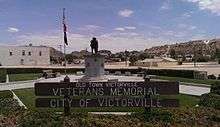
A controversial revitalization project started in 1995 in the ten square blocks along Historic Route 66. After years of setbacks in developing Old Town, the city—along with input from residents and local business owners—created an Old Town Strategic Action Plan in 2007. In 2008, demolition on hazardous and dilapidated buildings began. In 2010, as the economy declined, the statewide end of Economic Redevelopment Agencies, which funded the project, placed further work on indefinite hold.[40] As of 2012, the area still had problems with crime and homelessness, and many buildings remain boarded up.[41]
Notable changes made in Old Town Victorville are the Veteran's Memorial on the corner of Seventh Street and Forrest Avenue, the Route 66 Museum on D Street, the Transportation Center on D Street, and the Old Victor School on Sixth Street.
Local areas
There are several notable areas and locations within Victorville such as Spring Valley Lake, the Old Sheriff's Office, U.S. Route 66, the Victorville Film Archive, and the Southern California Logistics Airport.
Filming location
Victorville has been used for commercial filming several times:
- 3 Bad Men (1926), filmed northwest of Victorville and the surrounding desert;[42]
- It Came from Outer Space (1953), filmed in Victorville and the surrounding desert; Victorville served as the setting for the fictional town of "Sand Rock, Arizona".[43]
- Grand Theft Auto (1977), starring Ron Howard filmed in Downtown Victorville.[44]
- The Hills Have Eyes (1977) by Wes Craven[45]
- The Hitcher (1986), starring Rutger Hauer, C. Thomas Howell, and Jennifer Jason Leigh, was filmed at the Outpost truck stop. Many local residents were used as extras.[46]
- Lethal Weapon (1987) was filmed at El Mirage Dry Lake west of Victorville.[47]
- From Dusk till Dawn (1996), the restaurant scene early in the movie[48]
- Face/Off (1997), portions filmed at Southern California Logistics Airport in Victorville[49]
- Breakdown (1997) starring Kurt Russell, filmed in downtown Victorville[50]
- Contact (1997), also partially filmed in Victorville,[51] with some local residents used as extras.
- Play It to the Bone (1999) filmed partly in The New Reflections concert venue in Downtown[52]
- Kill Bill: Volume 2 (2004) was filmed in The New Reflections as well[53]
- The Fast and the Furious: Tokyo Drift (2006) was partially filmed in Victorville.[54]
- On Cinema
- Sky (2015) included a dinner scene filmed in Emma Jean's Holland Burger Cafe in Victorville.[55]
Notable people
- Earl W. Bascom, rodeo pioneer, cowboy artist and sculptor, Rodeo Hall of Fame inductee[56][57][58][59]
- Harold Budd, Los Angeles–born ambient composer[60]
- Matt Chapman, Major League Baseball infielder
- Jesse Chavez, Major League Baseball pitcher[61]
- Ryan Garcia, professional boxer
- John W. Henry, businessman
- Dominick Reyes, MMA Fighter and UFC light heavyweight title challenger
- Patty Jenkins, writer and director of 2017 film Wonder Woman
- Trever Keith, musician, and front man of punk-pop group Face to Face
- Raven, drag queen and performer
- Stevie Ryan, writer, comedian, and star of Stevie TV[62]
- Gregg Turkington, Head Archivist at the Victorville Film Archive
- Jason Vargas, professional baseball pitcher
- Travis Van Winkle, actor
References
- "Victorville". Geographic Names Information System. United States Geological Survey. Retrieved November 17, 2014.
- "California Cities by Incorporation Date". California Association of Local Agency Formation Commissions. Archived from the original (Word) on November 3, 2014. Retrieved August 25, 2014.
- "About Victorville". City of Victorville. Retrieved February 18, 2015.
- "members". City of Victorville. Retrieved December 19, 2014.
- Victorville, City of. "Index". Victorville, City of. Retrieved January 8, 2010.
- "2019 U.S. Gazetteer Files". United States Census Bureau. Retrieved July 1, 2020.
- "Victorville (city) QuickFacts". United States Census Bureau. Archived from the original on February 21, 2015. Retrieved February 18, 2015.
- "Population and Housing Unit Estimates". Retrieved May 21, 2020.
- "USPS - ZIP Code Lookup - Find a ZIP+ 4 Code By City Results". Retrieved February 20, 2007.
- "Number Administration System - NPA and City/Town Search Results". Archived from the original on September 29, 2007. Retrieved February 20, 2007.
- "Lane'S Crossing". Mojavedesert.net. Retrieved November 4, 2013.
- Thompson, Richard D. and Kathryn L. "Pioneer of the Mojave: The Life and Times of Aaron G. Lane". MojaveHistory.com. Retrieved December 2, 2008.
- "A Settlement On The Mojave". Mojavedesert.net. Retrieved November 4, 2013.
- Lebo, Harlan (1990). Citizen Kane: The Fiftieth Anniversary Album. New York: Doubleday. ISBN 978-0-385-41473-9.
- "Joseph Campbell and Jean De Blasis Interview". Mohave Historical Society Oral Histories. Mojave Desert History. Retrieved February 4, 2016.
- "Museum is now CLOSED...Disregard all info below". www.royrogers.com. Archived from the original on March 17, 2018. Retrieved March 29, 2018.
- "SoCal chills ahead of weekend storm". Victor Valley News. January 2, 2019. Retrieved July 17, 2019.
- "Winter comes for High Desert: Region to see rain, snow at 2,500-foot level". Victor Valley News. February 26, 2018. Retrieved July 17, 2019.
- "Victor Valley awakens to snow". Victor Valley News. February 21, 2019. Retrieved July 17, 2019.
- "Black Ice Causing Accidents In the Victor Valley". Victor Valley News. January 24, 2017. Retrieved April 2, 2017.
- "Heat wave ushering in sizzling temps: High of 110 degrees Friday prompts Excessive Heat Watch". Victor Valley News. July 3, 2018. Retrieved July 17, 2019.
- "Some parts of High Desert get more rain". Victor Valley News. July 30, 2015. Retrieved July 17, 2019.
- "Flooding, Lightning, Hail and Funnel Clouds: Summer Storm Brings Wild Weather to Parts of SoCal". KTLA. August 16, 2018. Retrieved July 17, 2019.
- "High winds sweep through High Desert, causing havoc". Victor Valley News. March 30, 2017. Retrieved July 17, 2019.
- "VICTORVILLE, CALIFORNIA - Climate Summary". Wrcc.dri.edu. Retrieved November 4, 2013.
- "Average Weather in Victorville California, United States". WeatherSpark. Retrieved July 17, 2019.
- "Victorville, CA Monthly Weather". Weather Channel. Retrieved July 17, 2019.
- "Victorville California Weather Temps, Rainfall". SeeCalifornia. Retrieved July 17, 2019.
- "Census of Population and Housing". Census.gov. Retrieved June 4, 2015.
- "2010 Census Interactive Population Search: CA - Victorville city". U.S. Census Bureau. Archived from the original on July 15, 2014. Retrieved July 12, 2014.
- 2000 US Census Factfinder♙
- "Statewide Database". UC Regents. Archived from the original on February 1, 2015. Retrieved November 29, 2014.
- "California's 8th Congressional District - Representatives & District Map". Civic Impulse, LLC. Retrieved March 9, 2013.
- "Basic Financial Statements and Supplementary Information, Year ended June 30, 2009" (PDF). City of Victorville. p. 160.
- "Schools Archived April 7, 2016, at the Wayback Machine." City of Victorville. Retrieved on May 8, 2016.
- "Victorville, CA - Southwest Chief Train (VRV)". Amtrak.com. Amtrak. Retrieved January 11, 2014.
- "ATTENTION GREYHOUND PASSENGERS!!!" (PDF). Vvta.org. Victor Valley Transit Authority. Archived from the original (PDF) on March 17, 2012. Retrieved January 11, 2014.
- Velotta, Richard N. (September 18, 2018). "Florida firm acquires company planning Las Vegas to LA rail line". Las Vegas Review-Journal. Retrieved September 18, 2018.
- "NTC Commuter Bus". Commuter Options. National Training Center, Fort Irwin. Retrieved January 1, 2016.
Victor Valley Transit Authority (VVTA) operates bus service from Victorville, Silver Lakes and Barstow to and from Fort Irwin called the “NTC Commuter”.
- "Roaming around Old Town | press, daily, click - Victorville Daily Press". Vvdailypress.com. August 15, 2012. Retrieved November 4, 2013.
- "Old Town's event center closes door — again | victorville, closes, door - Victorville Daily Press". Vvdailypress.com. April 25, 2012. Retrieved November 4, 2013.
- "3 Bad Men locations". IMDb.com. Retrieved February 2, 2019.
- "It Came From Outer Space locations". IMDb.com. Retrieved May 11, 2011.
- "Grand Theft Auto details". Retrieved May 11, 2011.
- "The Hills Have Eyes details". Retrieved May 11, 2011.
- "The Hitcher locations". IMDb.com. Retrieved May 11, 2011.
- "Lethal Weapon locations". IMDb.com. Retrieved May 11, 2011.
- Medved, Harry; Akiyama, Bruce (2006). Hollywood Escapes: The Moviegoer's Guide to Exploring Southern California's Great Outdoors. New York: St. Martin's Press. p. 150. ISBN 978-0312308568.
- "Face/Off locations". IMDb.com. Retrieved May 11, 2011.
- "Breakdown locations". IMDb.com. Retrieved May 11, 2011.
- "Contact locations". IMDb.com. Retrieved May 11, 2011.
- "Play It to the Bone locations". IMDb.com. Retrieved May 11, 2011.
- "Kill Bill: Volume 2 locations". IMDb.com. Retrieved May 11, 2011.
- "The Fast and the Furious: Tokyo Drift locations". IMDb.com. Retrieved May 11, 2011.
- "Sky (2015) - Filming Locations". IMDb.com. Retrieved August 22, 2016.
- Victor Valley Magazine "Earl Bascom, Cowboy Artist" (June 1983)
- Who's Who in California, Historical Society 1993
- The Pioneer "SUP Pioneer Cowboy inducted into Hall of Fame"
- ProRodeo Sports News "Bascom Dies at 89" (September 17, 1995)
- "Harold Budd - Biography & History - AllMusic". AllMusic. Retrieved September 22, 2018.
- "Jesse Chavez Stats". Baseball Almanac. Retrieved December 3, 2012.
- Staggs, Brooke (February 20, 2012). "Victorville native lands VH1 show". Daily Press. Retrieved March 26, 2015.
External links
| Wikimedia Commons has media related to Victorville, California. |
